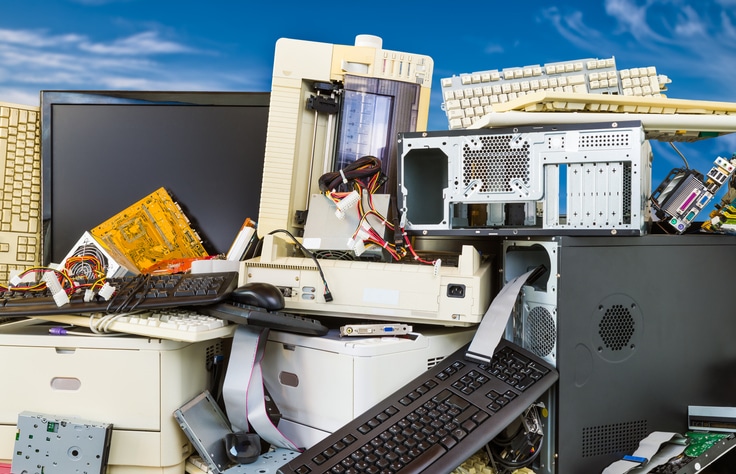-
September 3, 2024
What To Do With Your Company’s Outdated Electronics

You’re not alone if your company has a closet full of old computers, monitors and keyboards. And if your desk has a bottom drawer stuffed with old cell phones and thumb drives, welcome to the club.
In the United States alone, we generate about 6.9 million tons of e-waste annually. However, according to the US PIRG Educational Fund, only 17.4% of this e-waste is recycled correctly worldwide.
While many companies have systems to recycle office paper or send it for destruction to vendors like Infoshred, many haven’t put in place a way to safely and securely destroy old electronics. As a result, employees keep getting new devices and stashing the old ones wherever possible. This takes up space and poses a security risk for all the confidential data stored on those devices. In addition, some of these electronics can and should be recycled. Lastly, e-waste can contain hazardous materials such as lead and mercury that require special handling to avoid releasing them into the environment.
Infoshred’s Michael LeClair knows all about this. He’s Infoshred’s Director of Operations & Sales, overseeing, among other things, the company’s destruction and recycling services of all things electronic. “For over a decade, we’ve been helping companies safely and securely get rid of all that e-waste,” he says. “We handle anything you can think of in an office with an electronic component. Our customers turn to us to safely and securely dispose of laptops, cell phones, printers, flat-screen TVs, calculators, iPads, mainframe computers and even old office phones. “
The escalating amount of e-waste is inevitable in today’s technology-driven business world. “Today, there is more of a focus on doing things electronically,” says LeClair. “Technology changes so frequently that every couple of years, there’s some refresh where the technology changes. As the technology changes, there’s now a whole new waste stream of materials headed for landfills that should be responsibly dealt with instead.”
How did we get to this point? LeClair points out that the seeds of this problem started many years ago. “In the beginning, companies were getting rid of things and not paying attention to where they were going. They were hiring traditional trash haulers to cart them away. There were horror stories of them ending up on beaches in Thailand and China. That’s because the companies carting the material away weren’t held accountable for where that material ended up. Today, responsible vendors like us have a downstream process to handle these electronics responsibly. The electronics we pick up for our clients are handled properly throughout their entire lifecycle. We have a structured and carefully monitored process to ensure everything is handled responsibly, data is protected, dangerous components are separated, and whatever can be re-used is salvaged. If electronics aren’t handled properly, they can cause environmental issues.”
For the past decade, Infoshred has handled electronics at the end of their lives from just about any industry in Connecticut. “Every business creates its share of e-waste,” LeClair says. “We’ve worked with banks, financial institutions, health care providers, and companies in the insurance sector. We’ve also done quite a bit with manufacturing, aerospace, aerospace suppliers, and local and state municipalities, including police, schools, and government offices. The sky’s the limit. They all need ways to safely and securely retire their outdated electronics.”
The Life and Death of a Hard Drive
Hard drives, whether the old-fashioned bulky device or today’s compact Solid State Drives (SSDs), hold a world of data. One SSD in a personal computer can hold 500 gigabytes to 1 terabyte of data. That’s equivalent to 50 full HD movies, thousands of high-quality photos, hundreds of hours of music and numerous business documents, presentations, and spreadsheets. The implications of that ending up in a landfill can be a security nightmare. And “wiping” those drives does not guarantee the data is destroyed. “To protect the confidentiality of that data, that hard drive must be physically destroyed,” says LeClair. “Some companies think that drilling one hole in the center of it will make the data irretrievable. Not so. That’s not a 100% proven process. When we shred those drives, there’s no way anybody’s getting any information from them. That also applies to thumb drives and the tiny cards in your phone. The only way to make sure that data can’t be recovered from them is if these devices are physically shredded. Once these devices are shredded, they are sent downstream where they are ultimately melted down, and the various metals are extracted for reuse.”
Responsible Handling
As an experienced destruction company, Infoshred applies its 25+ years of experience handling sensitive paper documents to the safe and secure destruction of electronic devices. “As the devices have evolved, so has our destruction process,” says LeClair. “The smaller devices need to be shredded in specialized machines. We can’t run them through our big commercial shredders. So we’ve had to bring on special devices to handle them. There has been a significant shift in terms of the equipment and the size of the material we’re having to destroy. Whether it’s an iPad from a doctor’s office with sensitive health information or a desktop from a bank with financial information, all need to be handled with the same attention to confidentiality that we use to destroy paper documents. Our goal is that whatever we take in is destroyed properly. So, nobody’s data gets out there, and anything that can be reused is recycled properly.”
Part of that safe handling is documenting that items have been appropriately handled. “We comply with the strict standards of the NAID AAA certification and are annually reviewed to ensure we continue our certification with that standard-setting organization,” says LeClair. “We provide our customers with a certificate of destruction that says to them that whatever they gave us was properly destroyed, managed throughout the process and properly recycled. Some of our customers want us to provide them with a log of everything they’ve given us, including the serial numbers, types of devices, and asset tags. We can tailor the documentation to meet the requirements of their industries. Those documents are also useful from a property tax standpoint, so they only have to pay property taxes on their current equipment.”
Tracked from Start to Finish
Like the paper documents that Infoshred is called upon to destroy confidentially, outdated electronics are safeguarded from pickup to destruction. “When we take possession at a client’s location, we put it in a locked truck,” says LeClair. “If the customer chooses, we can even destroy the electronics on-site. If they prefer that we do it at our plant, the devices are loaded onto a secured truck. These are driven by our employees, who are fully background-checked and vetted through multiple layers of approval. Those trucks are tracked throughout their journeys back to our secure facility. They come into our secured plant, surrounded by a barbed wire fence and a locked gate and covered by security cameras 24 hours a day. From the time they reach our facility, they’re under surveillance by 47 cameras, and all doors are locked and monitored. Once those items reach our secure facility, they are monitored and destroyed quickly.”
Meeting the Need
Given the escalating need for increased processing capacity and the growth of AI, the amount of e-waste is expected to continue its dramatic rise. In fact, by 2030, the World Economic Forum estimates that we’ll produce around 81.6 million tons of e-waste annually. That cannot and should not end up in landfills for the sake of privacy and, more importantly, for the planet’s future.
Infoshred will continue to evolve its capacity to safely and securely handle e-waste. If your company is ready for a better way to dispose of your outdated electronics, contact Infoshred today for a free quote.
Popular Posts
Helpful Resources
Interested in Shred Events?
Come be a part of one of Infoshred’s upcoming Shred Events! We provide a safe, eco-friendly way to dispose of your confidential paper documents. With easy-to-reach locations and convenient dates, we’re here to help you safeguard your information while giving back to local causes.



